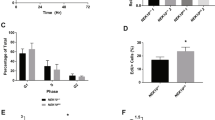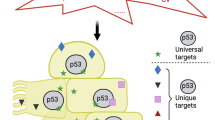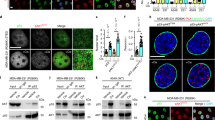Abstract
p73 is a member of the p53 family. Recent studies have shown that DNA damage can stabilize p73 protein and enhance p73-mediated apoptosis in a c-Abl dependent manner. To determine what regulates p73 transcriptionally, we analysed the expression of p73 in several cell lines following genotoxic stresses. We found that p73 is induced in certain cell lines when treated with therapeutic DNA damaging agents. We also found that p53 and p73, but not mutant p53(R249S) and p73β292, directly induce the expression of the p73 gene. In addition, we found one potential p53-binding site in the promoter of the p73 gene. This binding site is responsive to p53, p73, and DNA damage. Taken together, these data suggest that p73 is transcriptionally regulated by DNA damage and p53, and is autoregulated.
This is a preview of subscription content, access via your institution
Access options
Subscribe to this journal
Receive 50 print issues and online access
$259.00 per year
only $5.18 per issue
Buy this article
- Purchase on Springer Link
- Instant access to full article PDF
Prices may be subject to local taxes which are calculated during checkout



Similar content being viewed by others
References
Agami R, Blandino G, Oren M and Shaul Y. . 1999 Nature 399: 809–813.
Chen X. . 1999 Mol. Med. Today 5: 387–392.
De Laurenzi V, Costanzo A, Barcaroli D, Terrinoni A, Falco M, Annicchiarico-Petruzzelli M, Levrero M and Melino G. . 1998 J. Exp. Med. 188: 1763–1768.
De Laurenzi V, Catani M, Costanzo A, Terrinoni A, Corazzari M, Levrero M, Knight R and Melino G. . 1999 Cell Death Differ. 6: 389–390.
Deffie A, Wu H, Reinke V and Lozano G. . 1993 Mol. Cell. Biol. 13: 3415–3423.
Di Como CJ, Gaiddon C and Prives C. . 1999 Mol. Cell. Biol. 19: 1438–1449.
Donehower LA, Harvey M, Slagle BL, McArthur MJ, Montgomery Jr CA, Butel JS and Bradley A. . 1992 Nature 356: 215–221.
el-Deiry WS, Kern SE, Pietenpol JA, Kinzler KW and Vogelstein B. . 1992 Nat. Genet. 1: 45–49.
el-Deiry WS, Tokino T, Velculescu VE, Levy DB, Parsons R, Trent JM, Lin D, Mercer WE, Kinzler KW and Vogelstein B. . 1993 Cell 75: 817–825.
Gong JG, Costanzo A, Yang HQ, Melino G, Kaelin Jr WG, Levrero M and Wang JY. . 1999 Nature 399: 806–809.
Johansen FE and Prywes R. . 1994 Mol. Cell. Biol. 14: 5920–5928.
Jost CA, Marin MC and Kaelin Jr WG. . 1997 Nature 389: 191–194.
Kaelin Jr WG. . 1999 Oncogene 18: 7701–7705.
Kaghad M, Bonnet H, Yang A, Creancier L, Biscan JC, Valent A, Minty A, Chalon P, Lelias JM, Dumont X, Ferrar P, McKeon F and Caput D. . 1997 Cell 90: 809–819.
Kern SE, Kinzler KW, Bruskin A, Jarosz D, Friedman P, Prives C and Vogelstein B. . 1991 Science 252: 1708–1711.
Marin MC, Jost CA, Brooks LA, Irwin MS, O'Nions J, Tidy JA, James N, McGregor JM, Harwood CA, Yulug IG, Vousden KH, Allday MJ, Gusterson B, Ikawa S, Hinds PW, Crook T and Kaelin Jr WG. . 2000 Nat. Genet. 25: 47–54.
Yang A, Walker N, Bronson R, Kaghad M, Oosterwegel M, Bonnin J, Vagner C, Bonnet H, Dikkes P, Sharpe A, McKeon F and Caput D. . 2000 Nature 404: 99–103.
Yu J, Zhang L, Hwang PM, Rago C, Kinzler KW and Vogelstein B. . 1999 Proc. Natl. Acad. Sci. USA 96: 14517–14522.
Yuan ZM, Shioya H, Ishiko T, Sun X, Gu J, Huang YY, Lu H, Kharbanda S, Weichselbaum R and Kufe D. . 1999 Nature 399: 814–817.
Zaika AI, Kovalev S, Marchenko ND and Moll UM. . 1999 Cancer Res. 59: 3257–3263.
Zhu J, Jiang J, Zhou W and Chen X. . 1998a Cancer Res. 58: 5061–5065.
Zhu J, Zhou W, Jiang J and Chen X. . 1998b J. Biol. Chem. 273: 13030–13036.
Zhu KJW, Zhu J, Jiang J, Shou J and Chen X. . 1999 Oncogene 18: 7740–7747.
Acknowledgements
We are grateful to R Markowitz for critical reading of this manuscript. We would like to thank Dr C Harris (NIH) for providing the p73 BAC genomic DNA clone, and Drs C Prives and C Di Como (Columbia University) for providing rabbit anti-p73 antibody. This work is supported in part by Grant RO1 CA81237 and CA76069 from the National Institutes of Health and Grant DAMD 17-97-1-7019 from the United States DOD Breast Cancer Research Program.
Author information
Authors and Affiliations
Rights and permissions
About this article
Cite this article
Chen, X., Zheng, Y., Zhu, J. et al. p73 is transcriptionally regulated by DNA damage, p53, and p73. Oncogene 20, 769–774 (2001). https://doi.org/10.1038/sj.onc.1204149
Received:
Revised:
Accepted:
Published:
Issue Date:
DOI: https://doi.org/10.1038/sj.onc.1204149
Keywords
This article is cited by
-
Gelam honey attenuated radiation-induced cell death in human diploid fibroblasts by promoting cell cycle progression and inhibiting apoptosis
BMC Complementary and Alternative Medicine (2014)
-
Correlation between low-level expression of the tumor suppressor gene TAp73 and the chemoresistance of human glioma stem cells
Cancer Chemotherapy and Pharmacology (2012)
-
Camptothecin induces p53-dependent and -independent apoptogenic signaling in melanoma cells
Apoptosis (2011)
-
p73 is essential for vitamin D-mediated osteoblastic differentiation
Cell Death & Differentiation (2010)
-
PML involvement in the p73-mediated E1A-induced suppression of EGFR and induction of apoptosis in head and neck cancers
Oncogene (2009)



